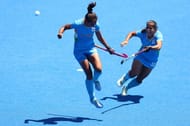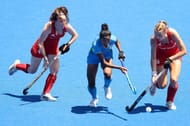Sjoerd Marijne's Indians battled hard before going down by a 3-4 margin against Great Britain in the bronze-medal game of the women's field hockey competition at the Tokyo Olympics.
Rani and co, who were ranked tenth coming into the Olympics, had been drawn into a formidable group consisting of world champions, the Netherlands, defending champions Great Britain, world cup silver-medallists Ireland, Germany, and South Africa.
While China and Japan - the other Asian sides in the competition - failed to make the knock-outs, the Indians came tantalizingly close to winning a bronze medal for the first time.
The Indian women's hockey team received an invitation to take part in the boycott-hit Moscow Games in 1980, after which they failed to qualify for 36 years.
When they finally qualified in 2016, the girls lost all their matches and ended up last. However, they have since undergone a transformation in terms of strength, fitness, and stamina.

While many of the players in the current squad were in Rio as well, Chief Coach Sjoerd Marijne and Scientific Advisor Wayne Lombard have ensured that the girls now match up with the best in the business on the fitness front.
The win against the Australians, which booked the girls a place in the Olympic semifinals, was no miracle.
The Indian Eves very nearly got the better of the Hockeyroos in the semifinals of the 2018 Commonwealth Games as well and have been troubling the top teams consistently ever since.
A place in the 2018 World Cup quarterfinals was proof that the team had come of age. Marijne's chargers have only gotten better ever since.
The Indian Eves were at a distinct disadvantage compared to their rivals in Tokyo after not having been part of the Hockey Pro League.
Despite the lack of game time in the lead up to Tokyo, they managed to hold their own against teams like Ireland, Australia, Argentina, and Great Britain.
Gurjit Kaur rose to the occasion to score three magnificent goals - one against Australia and two in the bronze-medal match against Great Britain - to be counted in with the best drag-flickers in the game today.
The Indian defense displayed their class by thwarting Australia's formidable forward line and keeping the team in the contest against Argentina for long periods.
Savita Punia was outstanding in goal, displaying razor-sharp reflexes and dexterity to pull off some incredible saves. Her performance in Tokyo will rank as one of her best ever shows on the big stage.
The Indians were never like the proverbial underdogs who usually resort to defending in numbers against the big sides after scoring early.
Sjoerd Marijne's team took the attack to the opposition and displayed great maturity as they controlled the midfield against Australia and rattled Great Britain with some inventive attacks in the bronze-medal match.

Salima Tete and Sharmila Devi, the two nineteen-year-olds, have had a memorable tournament as they often caught the opposition defense unawares with scorching runs and stinging crosses.
India may well have missed a bronze by a whisker, but the prize for Indian hockey fans is that they now have a women's team to look up to - and one that matches up with the giants of the game.
The Indians are now ranked seventh, as per the latest FIH Rankings, and rightly so.
As Sjoerd Marijne and the Indian girls begin their journey back home, there is a realization amongst the hockey fraternity in the country that this is indeed the beginning of a new chapter for the women's game in India, and absolutely not the end.
